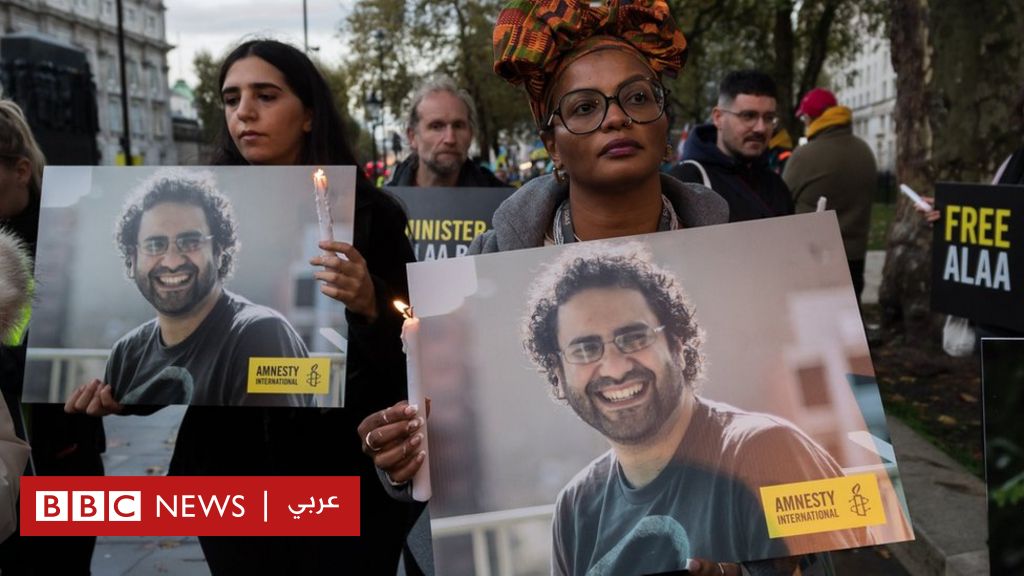The United Nations said Alaa Abdel Fattah was among a number of Egyptians “arbitrarily deprived of their liberty”.
US President Joe Biden intends to raise the issue of human rights in Egypt, where he is visiting to attend the COP27 climate conference.
A senior official told reporters that Biden will hold a bilateral meeting with his Egyptian counterpart Abdel Fattah al-Sisi during his brief visit to Egypt on Friday.
The official expressed the White House’s concern over the case of jailed Egyptian activist Alaa Abdel-Fattah and “reports on his health, and we have repeatedly raised concerns with the Egyptian government about his case and conditions in prison.”
For his part, the United Nations High Commissioner for Human Rights urged Egypt to immediately release Egyptian-British pro-democracy activist Alaa Abdel Fattah. Volker Türk said his life was “in grave danger” after he escalated his hunger strike and stopped drinking water.
Alaa went on a hunger strike in April to protest the Egyptian authorities’ refusal to allow the British consulate to visit him.
Pressures on Egypt for its liberation intensified on Tuesday, and after Paris and London, the United Nations and Berlin joined the voices that it was not abandoned to its fate.
German Chancellor Olaf Scholz appealed for Alaa’s release from Sharm el-Sheikh, saying: “There must be a decision. Her release must be possible so that her hunger strike does not end in death.”
He added: “The situation is very tense and we should fear that this will lead to horrible results.”
Alaa’s sister, Sana Seif, said: “All we know is that Alaa stopped drinking water 50 hours ago. We don’t know where he is and we don’t know if he’s alive.”
“My mother waited outside the prison gates for 10 hours yesterday to receive her weekly letter. They gave her none. Now she’s back at those gates,” she said, in a press conference at the COP27 Climate Conference in Sharm el. Sheikh.
He added: “I have asked the British authorities to provide us with some evidence that Alaa is alive and conscious. I have not received any response.”
British Prime Minister Rishi Sunak, during a meeting with President Sisi in Sharm el-Sheikh on Monday, stressed his “deep concern” about the Alaa case and said he “hoped to see a solution as soon as possible,” according to a Downing Street spokesperson.
Sana was also very concerned about the recent statements by Egyptian Foreign Minister Sameh Shoukry, who chairs the conference, and President Sisi.
Mona Seif, sister of Alaa Abdel Fattah, during a demonstration in front of the British Foreign Office in London
Shoukry told CNBC on Monday that prison authorities were providing Alaa “health care and assistance available to all detainees,” while the French president said Sisi assured him that Egypt “is committed to ensuring health by Alaa Abdel Fattah is preserved “.
“Are they force-feeding my brother now? Is he chained to a bed and being treated intravenously against his will? That’s what it looks like to me,” Sana said. “If so, he has fallen into a worse nightmare than he already was,” she continued.
“We know they are happy with his death,” he added. “The only thing they care about is that this doesn’t happen while the world is watching.”
Shoukry also said legal procedures “have not yet been completed” for Egypt to recognize Alaa’s dual British citizenship, which he obtained last December through his London-born mother, Laila Soueif.
In a statement released in Geneva, the High Commissioner for Human Rights urged the Egyptian government to “immediately release Abdel Fattah from prison and provide him with the necessary medical treatment”.
“Abdel-Fattah is in grave danger. His hunger strike puts his life in grave danger,” Turk said, describing him as one of the many people in Egypt who have been “arbitrarily deprived of their freedom”.
But his comments were not limited to the case of the Egyptian-British activist alone.
“I call on the Egyptian authorities to fulfill their human rights obligations and to immediately release all those arbitrarily detained, including those awaiting trial, as well as those unjustly convicted,” he said. He added: “No one can be arrested for exercising his basic human rights.”
“Diplomatic and consular channels … are open between Egypt and the UK regarding this particular case. We are also dealing with the UN human rights system,” Egyptian Foreign Minister Representative Wael told BBC News. Abul-Magd.
Sanaa Seif went to Sharm el-Sheikh to campaign in defense of her brother Alaa.
Alaa, 40, father of a child, first appeared during the 2011 uprising in Egypt, which forced President Hosni Mubarak to step down.
Since Sisi came to power in 2014 after leading the military ousting of democratically elected Mubarak, Abdel Fattah has spent most of his time in prison or in the police.
Last year he was convicted of “spreading fake news” in a Facebook post and sentenced to five years in prison. Human rights groups described the accusation as bogus and the trial bogus.
In April, his family said he went on a partial hunger strike, consuming up to 100 calories per day.
Last week he told his relatives that he will only drink water until Sunday, when the climate conference starts, after which he will also stop.


